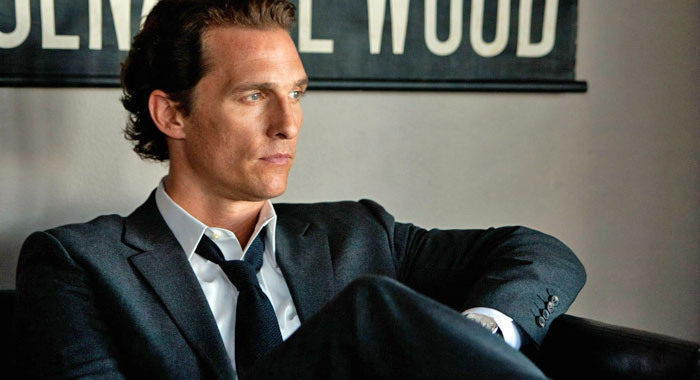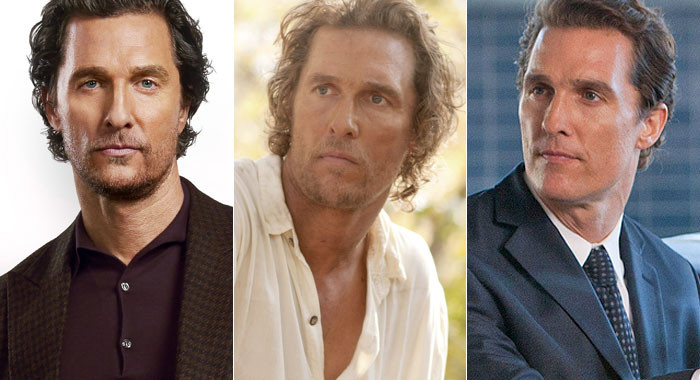In March 2011, as winter was drawing to a close, The Lincoln Lawyer starring Matthew McConaughey arrived in theaters, opening with iconic shots of a Lincoln Town Car cruising through the sunny streets of Los Angeles. This release wasn’t just a movie premiere; it was the dawn of a new era for McConaughey, igniting a career resurgence that would become known as the “McConaissance.” This period would be marked by critical acclaim, box office hits, and ultimately, an Oscar win in 2014.
Following lukewarm receptions for films like Ghosts of Girlfriends Past and Surfer, Dude, McConaughey surprised audiences and critics alike with his compelling portrayal of Michael “Mickey” Haller. Haller, a defense attorney whose office is famously the back seat of his Lincoln Town Car, driven by his former client Earl (Laurence Mason), felt like a role McConaughey was born to play. Adapted from Michael Connelly’s 2005 novel, this R-rated legal thriller, directed by Brad Furman, proved to be a box office success, grossing $80 million worldwide on a $40 million budget. More importantly, it was a critical darling. Critics and audiences, as reflected in its strong Rotten Tomatoes score, were united in their praise, declaring The Lincoln Lawyer guilty of being an exceptional courtroom drama. McConaughey’s magnetic screen presence is undeniable; he’s in almost every scene, expertly captured by cinematographer Lukas Ettlin’s dynamic camerawork as Mickey navigates the complex case of wealthy playboy Louis Roulet (Ryan Phillippe).
 Matthew McConaughey in The Lincoln Lawyer, showcasing his role as an excellent movie lawyer.
Matthew McConaughey in The Lincoln Lawyer, showcasing his role as an excellent movie lawyer.
Later in 2011, Richard Linklater’s Bernie and William Friedkin’s Killer Joe further cemented McConaughey’s transformation, effectively erasing memories of past missteps and catapulting him into a new phase of his career. Failure to Launch and similar films were quickly overshadowed by a string of critically acclaimed and commercially successful projects: The Paperboy, Mud, Magic Mike, Dallas Buyers Club (culminating in his Best Actor Oscar), The Wolf of Wall Street, True Detective, and the blockbuster Interstellar. Suddenly, everything McConaughey touched seemed to turn to gold – with the notable exceptions of Gold, Fool’s Gold, and Sahara, suggesting perhaps treasure hunting wasn’t his forte.
But what was it about The Lincoln Lawyer that set McConaughey on this remarkable path? Here are five key reasons why this film was the perfect vehicle to launch the McConaissance.
1. McConaughey’s Natural Talent as a Movie Lawyer, Validated by Rotten Tomatoes
While Dazed and Confused often gets cited as McConaughey’s breakthrough, it was arguably the 1996 courtroom drama A Time to Kill that truly launched his career into the stratosphere. This adaptation of the John Grisham novel saw McConaughey as Jake Brigance, defending Carl Lee Hailey (Samuel L. Jackson), a man who took justice into his own hands. A Time to Kill was a box office hit, earning $152 million globally, and garnered McConaughey the “Most Promising Actor” award from the Chicago Film Critics Association. The following year, he starred in Steven Spielberg’s Amistad, playing another lawyer in a historical drama based on the 1839 slave ship revolt. Both films were certified “Fresh” on Rotten Tomatoes, demonstrating his early success and critical recognition in legal roles.
After a decade dominated by romantic comedies and the entertaining-but-not-courtroom-based Reign of Fire, The Lincoln Lawyer and Bernie marked McConaughey’s return to the legal arena, reminding audiences of his inherent charisma and acting prowess in such roles. Mickey Haller is a character McConaughey inhabits completely, evident in every scene of The Lincoln Lawyer. Whether it’s the electric chemistry with Marisa Tomei or his masterful manipulation of Josh Lucas’s Ted Minton, McConaughey excels in portraying this morally ambiguous yet ultimately likable lawyer. A pivotal scene where Earl questions Mickey about his future after regaining his license encapsulates this perfectly. The unspoken understanding and shared smile between them solidify Mickey’s character – a flawed, divorced, and somewhat disliked alcoholic, but undeniably brilliant at his job. This scene, and McConaughey’s entire performance, resonates just as powerfully today as it did over a decade ago. The positive Rotten Tomatoes critical consensus further validates the strength of his performance and the film itself.
2. Reclaiming His Edge and Resetting His Career Trajectory
For those who grew up watching Dazed and Confused, McConaughey’s character Wooderson might have initially seemed like a cool, almost mythical figure. However, with time, the character’s more problematic aspects, particularly his interactions with younger girls, become apparent. This nuanced charm, the ability to find likability in questionable characters, is a McConaughey hallmark. While romantic comedies like How to Lose a Guy in 10 Days and The Wedding Planner broadened his fanbase, they arguably diluted the edgier persona he established early on in films like Dazed and Confused, Lone Star, and Frailty.
McConaughey truly shines when he embraces roles with a darker, more menacing undertone, as seen in Killer Joe, Magic Mike, and The Gentlemen. His monologue about the “laws of the jungle” in The Gentlemen and every moment of his screen time in Killer Joe are infused with unpredictable intensity and a palpable “don’t mess with me” vibe – qualities somewhat lost in films like Surfer, Dude. In The Lincoln Lawyer, Mickey Haller is far from perfect. He’s a flawed father, a failed husband, and bears responsibility for the wrongful conviction of an innocent man (Michael Peña). Yet, despite these significant flaws, McConaughey makes him captivating and relatable, revealing a hidden moral compass. The scene where Mickey confronts Peña’s character to uncover the truth showcases McConaughey’s vulnerability, nervousness, and desperation to rectify his past mistakes.
 Matthew McConaughey in The Gentlemen, Mud, and The Lincoln Lawyer, highlighting his versatility and range in different roles.
Matthew McConaughey in The Gentlemen, Mud, and The Lincoln Lawyer, highlighting his versatility and range in different roles.
Reviews for The Lincoln Lawyer, often highlighted on Rotten Tomatoes, praised McConaughey’s performance as “very refreshing,” “never-better,” and noted his unique ability to “swagger while sitting down.” This role acted as a reset button for McConaughey. In an interview with Cigar Aficionado magazine, he admitted that the McConaissance was a conscious decision to prioritize challenging roles over easy paychecks, choosing projects that “scared” him after years of rom-coms. While he appreciated providing “90-minute breezy romantic getaways,” he yearned to delve deeper into acting, and The Lincoln Lawyer marked the crucial first step in that journey. The film’s Rotten Tomatoes critical score reflected this renewed commitment, signaling a shift in audience and critical perception.
3. McConaughey’s R-Rated Success, Reflected in Rotten Tomatoes Scores
It’s fitting that The Lincoln Lawyer, an R-rated film, spearheaded McConaughey’s comeback, as his filmography reveals a striking pattern when analyzed through the lens of Rotten Tomatoes scores. His R-rated movies average a “Fresh” 60.2% Tomatometer score, while his PG-13 films average a “Rotten” 40.9%. This data strongly suggests that McConaughey thrives in more mature, adult-oriented content. In fact, 14 out of his 15 highest-rated films on Rotten Tomatoes are R-rated (Kubo and the Two Strings being the sole exception). His Oscar win for Dallas Buyers Club and the success of The Gentlemen (75% Tomatometer, 84% Audience Score, and $115 million worldwide) further underscore this trend. Essentially, for McConaughey, R often equals critical and commercial glory – with a few exceptions like Texas Chainsaw Massacre: The Next Generation, Tiptoes, and Surfer, Dude, which, ironically, have developed cult followings despite their poor Rotten Tomatoes ratings.
Even on television, his critically acclaimed role in HBO’s True Detective was in a TV-MA rated series, befitting its dark themes, violence, and profanity. His portrayal of Rust Cohle earned him Golden Globe and Emmy nominations, solidifying his dramatic range in mature content.
While his PG-13 films, particularly Interstellar and How to Lose a Guy in 10 Days, have been massive box office successes, his R-rated ventures like Mud, Killer Joe, and Magic Mike are often seen as more artistically fulfilling and career-defining. These lower-budget films allowed him to collaborate with directors like Steven Soderbergh and Jeff Nichols and push his acting boundaries. Even the notoriously panned R-rated film Serenity holds a certain bizarre charm and is arguably more memorable than some of his more conventional PG-13 fare.
Interestingly, between 2003 and 2011, McConaughey’s only “Fresh” film on Rotten Tomatoes was Tropic Thunder, an R-rated comedy where he played a memorable, albeit supporting role. His character, Rick Peck, the agent, is another example of McConaughey’s ability to embody cocky, dedicated characters, much like Mickey Haller.
4. The “M-Factor”: Characters Starting with “M” and Rotten Tomatoes Success
This might seem like a quirky observation, but there’s a curious pattern: R-rated movies where McConaughey plays characters with first or last names starting with “M” have an even higher average Rotten Tomatoes Tomatometer score of 76.5%. This is significantly higher than his overall R-rated average of 60.2%. During the McConaissance, some of his best-received films featured characters named Mud, Mickey, Moondog, Michael, and Mark. Is this just coincidence, or is there something more to this “M-Factor”?
Two of McConaughey’s most underrated performances, both in R-rated films with “M” names, are in The Beach Bum and Frailty (the latter predating the McConaissance but still relevant). In Harmony Korine’s The Beach Bum, McConaughey plays Moondog, a hedonistic writer in a role that feels like an exaggerated, alternate-reality version of himself. Frailty, directed by Bill Paxton, sees McConaughey as Fenton Meiks/Adam, a man grappling with a dark past and disturbing family secrets. Both roles, and the films themselves, have garnered critical appreciation, reflected in their Rotten Tomatoes scores, further strengthening this unusual “M-Factor” connection.
5. A Stellar Supporting Cast Elevating The Lincoln Lawyer, According to Critics
 The Lincoln Lawyer ensemble cast, highlighting the deep bench of talent in the film.
The Lincoln Lawyer ensemble cast, highlighting the deep bench of talent in the film.
While The Lincoln Lawyer is undoubtedly a McConaughey showcase, its success is also significantly boosted by an exceptional supporting cast. The film boasts a remarkable ensemble including John Leguizamo, Marisa Tomei, Josh Lucas, Laurence Mason, Michael Peña, William H. Macy, Shea Whigham, Frances Fisher, Ryan Phillippe, and Bryan Cranston. The dynamic interplay between McConaughey and these talented actors elevates his performance and the entire film. Critics often highlighted this aspect in their Rotten Tomatoes reviews, praising the depth and talent of the supporting cast.
His chemistry with Tomei as Mickey’s ex-wife, Maggie, is palpable, and Michael Peña delivers a heartbreaking performance as the wrongly accused Jesus Martinez. Ryan Phillippe effectively embodies the menacing villain, Louis Roulet. This ensemble cast creates a rich tapestry of characters, making The Lincoln Lawyer a highly rewatchable film.
This pattern of working with top-tier talent continued throughout the McConaissance. From Interstellar to The Wolf of Wall Street, Mud, Dallas Buyers Club, Bernie, and Magic Mike, McConaughey consistently surrounded himself with A-list actors delivering exceptional performances. This was a conscious choice, stemming from his decision in 2011 to pursue challenging, rewarding projects with talented collaborators. Would the McConaissance have happened without The Lincoln Lawyer? Perhaps, but it’s undeniable that this film, with its strong script, direction, McConaughey’s captivating lead performance, and a stellar Rotten Tomatoes critical reception, was the perfect catalyst for this extraordinary career transformation. And who knows, maybe it even indirectly inspired his iconic Lincoln commercials.
The Lincoln Lawyer was released in theaters on March 18, 2011.

